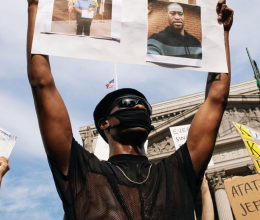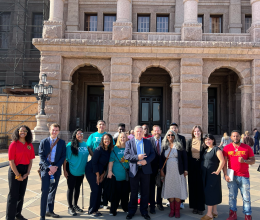
On June 8, ACLU of Texas policy and advocacy strategist, Adri Perez, testified before the El Paso City Council to call on its members and the mayor to take meaningful action in holding the El Paso Police Department accountable. Below is a transcript of the testimony Adri gave before the council.
Good afternoon council and mayor, my name is Adri Perez. I am an El Paso resident, a constituent, and voter in District 8.
As we’ve seen, the murder of George Floyd has mobilized people across the country to demand justice and accountability in policing. El Paso should seize this moment and respond with meaningful action to redefine the role of police in our community.
I am here today to recommend four steps the El Paso City Council should take.
First, police must be accountable for misconduct. Currently, the police union contract shields police officers from critical review and discipline. For example, the current contract allows complaints to expire 180 days after an incident of alleged misconduct, hides any misconduct and complaints from public view, and prevents the El Paso Police Department’s Office of Internal Affairs from interrogating officers immediately after an incident like a shooting.
The next police contract will be up for negotiation in 2023. City officials should make the next negotiation more transparent, with opportunities for the community to review the proposed contract and give input as a key way of building trust.
Second, we need independent oversight of police. Presently, there is no independent oversight. The so-called “Accountability Review Board” is appointed and managed by the department itself. The city should establish an independent body outside the chain of command to investigate allegations of police misconduct. This accountability is essential for any transformation in the culture of policing in our city.
Third, the department needs a modern use of force policy that prevents El Pasoans from being seriously harmed and killed by police. An updated policy should be developed with community input. It should require de-escalation practices and require officers to intervene and stop excessive force. Killings like those of Erik Salas and Mercedes DeMarco* at the hands of police are preventable with a standards-based use of force policy and police accountability for misconduct.
In addition, El Paso should ban the use of bean bag rounds, tear gas, and other weapons aimed at crowds of El Pasoans. All standard operating procedures, including the use of force policy, should be readily available online, as it is in other cities.
Finally, the best way to prevent crime is to invest in strong communities, healthy families, and good jobs. The El Paso Police Department is bigger than it’s ever been, with ambitions to hire an additional 140 officers. More police aren’t the answer to better safety. We should ask our officers to do less, like not policing in schools and not responding to mental health calls.
El Paso should do a top to bottom review of the police budget to find savings that can better be invested in solutions like cite-and-divert for misdemeanors, mental health interventions as an alternative to policing, diversion to rehab for low-level drug offenses, and family therapy for juveniles on probation.
Thank you for the opportunity to share these thoughts with you today on how we can transform the role of the police while investing in strong communities and safe neighborhoods.
*Editor’s note: The news coverage surrounding Mercedes DeMarco’s death refers to her using her birth name and he/his pronouns. DeMarco in fact used she/hers pronouns and identified as a transgender woman.







